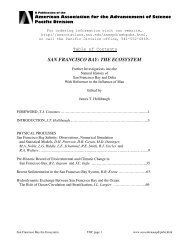Vol 31, Part I - forums.sou.edu ⢠Index page - Southern Oregon ...
Vol 31, Part I - forums.sou.edu ⢠Index page - Southern Oregon ...
Vol 31, Part I - forums.sou.edu ⢠Index page - Southern Oregon ...
Create successful ePaper yourself
Turn your PDF publications into a flip-book with our unique Google optimized e-Paper software.
ABSTRACTS – Symposia<br />
frequently involved in a key role during prevention, profiling<br />
and intervention as part of a multidisciplinary team. At a<br />
minimum, the role and responsibilities of a mental health professional<br />
by default requires advanced clinical skills, knowledge<br />
of the criminal justice system, as well as competencies<br />
for appropriately responding to cultural, ethical and forensic<br />
mental health issues emerging from Lone Wolf Terrorism<br />
cases. For example, are their forensic mental health standards<br />
for profiling practices that might be sufficient to compel<br />
police and public safety personnel to consider in their potential<br />
actions This forensic mental health science symposium<br />
presents a conceptual framework of the issues that surround<br />
forensic practices in Lone Wolf Terrorism (LWT) cases. The<br />
symposium uses forensic psychology as a platform to examine<br />
several mental health factors related to LWT. A question<br />
and answer period follows a counter-point discussion of each<br />
paper presented. This presentation offers more informative<br />
questions than answers relative to the mindset of a terrorist.<br />
It also provides profiling caveats related to conceptualizing<br />
a terrorist. For example, is there a maladaptive cognitive<br />
schema or classification format (e.g., GRIPE Model) that<br />
might allow security experts to better understand terrorists<br />
An internalized homeland security directive to “think like a<br />
terrorist” is instructive for antiterrorism efforts. What is lacking,<br />
however, is a clearer understanding of the motives behind<br />
strategic options terrorists are exercising and possible antiterrorism<br />
responses. Effective counterstrategies are difficult to<br />
craft without understanding the logic that fuels acts of terrorism.<br />
The presenter provides advice on ways a reasonable<br />
assessment may be employed as a way of organizing knowledge<br />
or disaggregating a largely new behavioral frontier.<br />
22 Forensic Psychology Cultural and Ethical Considerations<br />
in Homegrown Lone Wolf Terrorism Cases, KRIS-<br />
TEN N GREIDER*, CHRIS WEHRLE, NICK BOYD,<br />
and RONN JOHNSON (Clinical Mental Health Program,<br />
School of Leadership and Education Sciences, University of<br />
San Diego, 5998 Alcalá Park, San Diego, CA, 92110; kgreidero@gmail.com,<br />
ronnjohn@sandiego.<strong>edu</strong>).<br />
The role of forensic psychologists in international and<br />
national security related work has been a long debated ethical<br />
concern amongst the American Psychological Association<br />
(APA). Many government agencies are utilizing the expertise<br />
of forensic psychologists to aid in the interrogation, profiling,<br />
and psychological analysis of homegrown lone wolf<br />
terrorism cases. Depending upon the agency and capacity of<br />
the forensic psychologists work, one may ask the question,<br />
“Whose ethics do we follow” The APA has developed a special<br />
task force to address psychological ethics and national<br />
security concerns in the wake of 9/11. This paper discusses<br />
the ethical obligations forensic psychologists must adhere<br />
to when engaging in security related work. Vignettes as outlined<br />
in APA’s Presidential Task Force Manual are thoroughly<br />
examined through case scenario perspective. The authors also<br />
address cultural considerations when developing psychological<br />
evaluations of homegrown lone wolf terrorists.<br />
23 Identifying, Securing, Organizing and Reviewing Mental<br />
Health Data in the Norway Killer Case, RONN JOHNSON*,<br />
CHRIS WEHRLE, and , KRISTEN GREIDER (Clinical<br />
Mental Health Counseling, School of Leadership and Education<br />
Sciences, University of San Diego, 5998 Alcalá Park,<br />
San Diego, CA, 92110; ronnjohn@sandiego.<strong>edu</strong>).<br />
When a mental health professional becomes involved in<br />
what some have labeled a Lone Wolf case like the Norway<br />
Killings, there is information that must be taken into consideration.<br />
This forensic psychological data is relevant for evaluating,<br />
treating and making clinical judgments (i.e., mental state<br />
at the time of the offense MSO) regarding the accused. Before<br />
any mental health professional can determine what information<br />
is required, clearly defined roles must be established<br />
because the information needed may vary depending upon the<br />
mental health professional’s role as an expert witness, a consultant,<br />
or a therapist. Once roles are defined the mental health<br />
professional must have an understanding of legal and behavioral<br />
issues regarding the case. They must also determine the<br />
information they will need to fulfill their roles and gather that<br />
information. School, psychiatric, psychological, criminal, and<br />
employment records need to be secured in order to review relevant<br />
background information regarding the accused. Once<br />
information is gathered, mental health professionals must<br />
organize it in a relevant, informative, and defensible manner<br />
in order to serve their intended psycho-legal purpose. Mental<br />
health professionals must craft a forensic report that is relevant<br />
to the forensic questions being raised (e.g., insane or<br />
sane, competent or incompetent to stand trial). The forensic<br />
standards vary from country to country as well as state to<br />
state. Forensic work in these cases can be extremely time-consuming<br />
for mental health professionals. This paper examines<br />
the pertinent information relating to the Norway Killer case.<br />
Some attention is given to an effort to forensically analyze<br />
material developed by Anders Behring Breivik. Understanding<br />
what is needed before court proceedings begin can help<br />
mental health professionals to better manage their time and<br />
re<strong>sou</strong>rces during often lengthy and high profile trials.<br />
24 Opposing Psychological Reports on the Norway Killer<br />
Case, NICK BOYD*, LINH TRAN, and RONN JOHN-<br />
SON (Clinical Mental Health Counseling, School of Leadership<br />
and Education Sciences, University of San Diego, 5998<br />
Alcalá Park, San Diego, CA, 92110; ebessen@sandiego.<strong>edu</strong>,<br />
ronnjohn@sandiego.<strong>edu</strong>).<br />
When Anders Behring Breivik, the Norway Killer, was<br />
found in connection with mass murder that shook Europe<br />
and its Norwegian community, many questions followed as<br />
to his motives, ideology, background, and mental state. With<br />
the case currently on trial, new developments, questions, and<br />
answers continue to unfold. As we look to interpret Anders<br />
53








